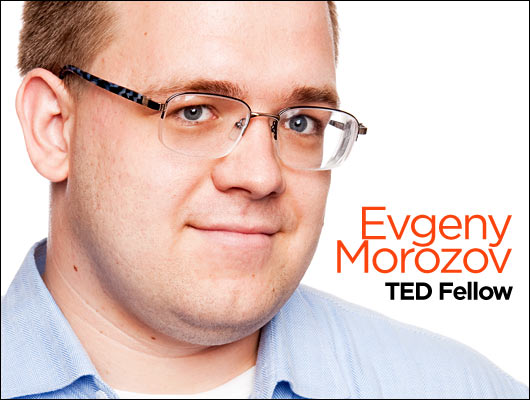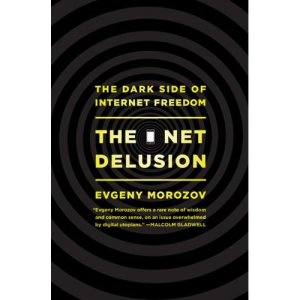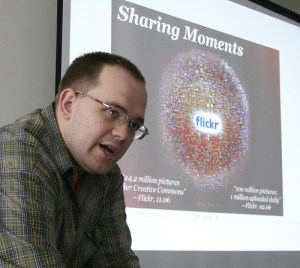Interactive Fellows Friday Feature!
Join the conversation by answering Fellows’ weekly questions via Facebook. This week, Evgeny asks:
What’s one event that made you rethink the political power of the Internet in the last 12 months and why?
Click here to respond!
Tell us how you came to write your book.
The Net Delusion: The Dark Side of Internet Freedom came out the first week of 2011. It draws on my work in Eastern Europe and Central Asia — basically the former Soviet space. I used to work for an NGO called Transitions Online, and I was their Director of New Media. I was a very idealistic fellow who thought that he could use blogs, social networks and new media to help promote democracy, human rights and freedom of expression. So I spent two and a half years traveling widely in the region, working with bloggers, activists and journalists, teaching them how to use blogs and wikis and social networks.
Much of our work was funded by various Western foundations and governments. After two and a half or three years of doing that, I began having second thoughts about the usefulness of new media and the usefulness of the Internet. I began seeing how many of the governments that we hoped to oppose with the help of new media, were actually beginning to react to what we were doing with their own online activities.
Some of the governments were beginning to pay bloggers to spread propaganda. Some of them were beginning to use social networking sites to track protesters and to gather information about the opposition. Some of them were beginning to use technologies supplied by Western companies to censor conversations online, or even to censor various text messages exchanged by protesters.
So I decided to take some time off, and spend a year or two examining some of the fundamental assumptions that drove my work in the past. I wanted to see where I may have been wrong, and why it was that the Internet was suddenly powering authoritarian governments as well. The book is really the result of this very hands-on empirical work, some intellectual reflections, and an analysis of some of the efforts that the American government has made in this space.
What is your broader agenda for the book? What are you trying to accomplish?
First of all, my hope for the book is that policymakers will recognize that the Internet is not only a tool of liberation, but that it’s also a tool of oppression. In many contexts, it oppresses more than it liberates.
Secondly, I try to offer a framework for policymakers and decision makers. I call it “cyber-realism,” which can supplement or replace, hopefully, the current ideology. The current ideology, which I dub “cyber-utopianism,” is the belief that the Internet is inherently liberating. I think that this is a very bad way to frame the debate, in particular the policy debate.
Thirdly, it’s also to make people in the West — especially America, but also Western Europe — aware of the responsibility they have domestically, in terms of reining in some of the excesses of American companies. American companies should think about how they treat data, user data, and how they respect privacy. Western companies need to think about the extent they want to go, in terms of selling censorship equipment and surveillance equipment to countries like China and Iran. Universities ought to be aware of the degree they would want to accept funding from governments like China to work on, say, face recognition technology. The point of my book is that the fight for Internet freedom should happen as much at home as it should abroad.
Do you make specific recommendations about Internet policy?
What I try to do in the book is to get as far away from the question of, “What needs to be done?” as I can. Because the question of, “What needs to be done?” presumes that there is something that the Internet can accomplish on its own. I think this is a very dangerous mentality. I call it, actually, “Internet-centrism.” That’s this belief that you have to start with the Internet, and that it can solve global problems.
I want to show that the old intellectual paradigm of the Internet as a tool of liberation is just false. The book isn’t to necessarily make a convincing, arguable case that the Internet is a tool of oppression. It’s just to show that we need a completely new intellectual paradigm for thinking about the impact of the Internet: you need to approach it from a completely different angle.
Instead of starting with the Internet, you have to start with each particular country that you want to transform. So you have to look at Russia, you have to look at China, you have to look at Iran, you have to look at Belarus and Syria. All of them are completely different environments. You have to empower decision makers who know the regional context, as opposed to technologists and people who know everything about Silicon Valley, but know very little about Iranian, Russian, or Chinese foreign policy. My argument really is geared towards people in entities like the State Department where there is a debate about how to proceed.
There is this group of people who love innovation. Those people want to innovate, and they think the Internet is a wonderful tool for innovation, which is true. But you also have to remember that much of that innovation is constrained within the realities of the foreign policy. I think that you have to start with the foreign policy debate before you can actually advance through this level of technology and innovation.
To give an example, during the protests in Iran in 2009, for example, the State Department famously reached out to Twitter. They asked them to delay maintenance that was scheduled during the protests that were happening in Tehran. That surely helped to prevent the maintenance, and Twitter stayed online and that was vitally embraced by many Twitterati digital enthusiasts.
But what it also did was to create this impression in the minds of the Iranian government, the Chinese government and the Russian government that Twitter is just an extension of American foreign policy, and it was just a tool to bring regime change to Iran. That, of course, then hurt many Twitter users in the country. It basically resulted in the Iranian government becoming much more suspicious about the power of the Internet: becoming much more aggressive, imposing extra restrictions, and seeking to control cyberspace much more.
What I want to do is ensure that similar mistakes by American diplomats are not repeated in the future.
To form sound policy, you need to start with people who actually know something about the history and environment of the region, and then have them try to second-guess what the impact of the Internet would be. You cannot start with Internet gurus, and have them establish a theory about the impact of the Internet on countries as diverse as Azerbaijan and Indonesia. Anyone who tells you that is a charlatan.
[Laughs] That will kill 10 prospective TED talks, I know.
How has the TED Fellowship impacted you?
I was always a fan of the TED Conference, so it was good to go and see and check it out with my own eyes. It was also good to test my ideas with some of the people in the audience, some of whom were actually those stereotypical “cyber-utopians” that I’m attacking in my book. It’s always good to hear from the other side.
It was also good to hear responses to my talk. Particularly after it was posted online, it got a lot of attention. It helped very specifically because the talk was released just a few weeks before my agent sold the proposal. So it was definitely helpful in terms of convincing publishers that I’m someone worth doing business with. On a very practical level, it was a huge help.
It was a huge booster in terms of generating feedback to my work. And also in terms of bringing awareness to people who I may not otherwise have reached, it was definitely helpful.
The first “T” of “TED” stands for “Technology.” Among all those people so enthusiastic about innovation, did you feel a bit like a lone wolf at the TED Conference?
Back when I gave my talk at TED in 2009, my argument was not as accepted as it is now. Right now there is much more buy-in for my argument. Even people like Clay Shirky have actually come to share some of my views – especially when it comes to the poor record of Washington’s engagement in this space. Back then, it was somewhat of a weird experience, particularly when I was giving my talk, because I think many people had not thought about it before. It was exactly the audience that is susceptible to “cyber-utopianism.”
I’m not anti-innovation. I’m not against innovation or progress. It’s just that very often, by touting technological innovation, we actually end up canceling out many of the achievements on the social and political end. So part of my argument is that, if anything, we should make sure that we do no harm. I think that’s one insight that has been missing so far from the broader debate about Internet freedom.
Even the term “Internet freedom” itself is highly dubious. Particularly when you consider the direction of domestic policy towards the Internet. If anything, if you really look at the evolution of the American approach to the Internet over the last three years, it has all been about asserting government control over the Internet. It has been targeting pirated movies and pirated music. It has been about giving more control to the NSA and FBI in terms of tracking what’s happening online so they can fight cyberwar and cybercrime. It has been pressuring intermediaries, as we saw with Wikileaks, to remove content from the servers … all of this is real world stuff. It’s not something that exists only virtually.
All of that is driven by the demands that the US government has when it comes to fighting war and crime and terrorism. Now, some of that is bad and inexcusable. But it’s definitely real. So when you have one part of the US government, the State Department, publicly embrace a concept like Internet freedom, most likely it will only embarrass the US government as a whole, because other parts of the US government are acting in a completely different direction.
As we have seen, in the case of Wikileaks, Hilary Clinton’s speech about Internet freedom now reads extremely hypocritical, just one year after it was delivered. I actually predicted in my book that something like Wikileaks would happen. Part of my argument was that you cannot really embark on such an ambitious policy without first fine-tuning, and without first connecting it, to the rest of the American policy. Otherwise it will just cause a lot of embarrassment, as it did.
You have humble beginnings, born to a family of miners in Belarus. Tell us about your journey to where you are now.
My parents both worked for this huge mining enterprise. They used to be miners, and they made their way through middle management.
I haven’t fully understood how exactly all this happened. I grew up in this small town, and I went to high school there. It was a very ordinary high school. I always wanted to study abroad, but my family didn’t have any money. I managed to win a scholarship to an American university in Bulgaria and studied business and economics. I ended up in Berlin, studying philosophy, for some reason, for a year. When I was in Berlin, I got involved in Transitions Online, a new media NGO, where I ended up working.
In parallel I started writing, mostly op-eds and columns for newspapers, mostly about new media. If you go and read some of my early columns from 2006, 2007 they actually are all very optimistic about the power of the Internet and such. I think I even wrote a very enthusiastic piece for Wikileaks for the Economist back in 2008, when no one knew them.
The Open Society Foundation invited me to work on the board of the Information Program. It is actually one of those entities that is trying to use the Internet, if not to promote democracy, to promote democratic values in places like Africa, Central Asia, and Eurasia. So that’s usually my counter-argument to anyone who accuses me of being a “cyber-pessimist.” I actually spend quite a lot of time thinking about how to untap the power of the Internet.
So anyway, I also got a fellowship from the Open Society Institute and I moved to the US with that fellowship. And I’ve been here since then, doing all sorts of fellowships from different places.
There are many aspiring social entrepreneurs out there who are trying to take their passion and ideas to the next level. What is one piece of advice you would give to them based on your own experiences and successes? Learn more about how to become a great social entrepreneur from all of the TED Fellows on the Case Foundation blog.
One good piece of advice to social entrepreneurs is to avoid situations where good solutions overtake better ones. There is an interesting effect in psychology called the Einstellung effect. It basically captures this very common occurrence where our previous experiences with things or strategies or ideas limit our horizons, in a sense.
If, for example, you are playing chess, and one particular tactic that you’ve used against your opponent has worked in the past, you may just keep using that tactic because you’ve already used it, and you know it works. You might not evaluate the environment again, perhaps coming up with a much better and faster solution.
As it applies to social entrepreneurs, I think they always have to know that there is probably a more optimal solution than the one they are currently considering.
You said you started off very idealistic. Was there a particular incident that made you start to rethink your assumptions?
There is this huge Roma problem in Europe. There are a lot of Romas who are discriminated against in countries like the Czech Republic or Hungary. They are an ethnic minority that in Europe everyone loves to hate.
My NGO was organizing a training for Roma journalists, to teach them how to use new media. I was invited to present. I came down to Prague with this very shiny PowerPoint I prepared. It was about all the web 2.0 goodies: Flickr, YouTube, Wikipedia. I had been talking for 25 minutes and was almost done, and I realized there were no questions, and people were looking at me with blank stares. It turns out that none of them actually spoke English, and they didn’t give me an interpreter or warn me that they didn’t speak English.
But what really set me off was that projects like this happen every week. I was lucky to see such an accident. It happened in part because there was just too much enthusiasm in Washington about using new media. And there were plenty of NGOs that were happy to accept money from Washington to create these fancy new media projects, and to suck in all the money and have little outcome. That was an accident that convinced me there was something wrong in the model by which people in Washington disperse grants and some NGOs pick them up.
Essentially, some of this is very similar to the development problems that happen in places like Africa, where you get a lot of Western NGOs coming in with a lot of Western money, and creating projects that do not make much sense, but they exist because they look very good on paper.
Do you ever get back to Belarus to visit?
Quite often, actually. I spent three weeks there just now. I spent two and a half months there this summer living in a forest, almost offline: just reading books and watching films. That was my “get offline” period. I would only go and check my email once a week.
It’s an interesting story, because if not for technology, I would never be able to afford a vacation like that. Not so much because I had work to do, but because I need to stay in the loop of what’s happening. I couldn’t have the New York Times delivered to my summer house in the forest in Belarus. But thanks to Kindle I was actually able to go to the city every Sunday, and gather up all the newspapers on my Kindle, and then come back the next week and do the same. I wanted to stay offline as much as possible, but the demands of the modern world still require me to read and to know what’s happening. In a sense, technology has helped me to avoid technology.



Comments (5)
Pingback: Open Source Intelligence › SOS, OSO
Pingback: El Oso » Archive » 4 Points on The Net Delusion
Pingback: TED Blog | Fellows Friday with Evgeny Morozov | study highschool abroad